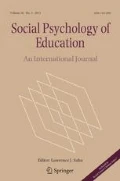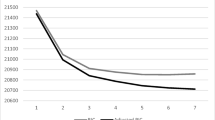Abstract
The present study examines students' perception of the teacher's role as epistemic authorities, that is, a source of determinative influence on the formation of individuals' knowledge, from three perspectives. First, it examines 7th and 10th graders' perception of their teachers as epistemic authorities. The results showed that a teacher's subject matter, as well as students' age and gender, influence perception of him/her as an epistemic authority. In addition, interest in the subject matter was found to be an important predictor of students' perception. The second part focuses on teachers' self-perceptions as epistemic authorities. The results indicated that teachers' personal efficacy is the most powerful predictor of their self-perception. Finally, the study compares students' perceptions of teachers as epistemic authorities, teachers' self-perceptions in these terms and teachers' perceptions of how their students perceive them. Two main findings showed the following: (a) teachers perceive themselves as being more of an epistemic authority than their students consider them; (b) teachers believe that students perceive them as being more of an epistemic authority than the students actually think.
Similar content being viewed by others
References
Abraham, A. (1974). Teachers' inner world. Tel Aviv: Otsar Hamoreh (in Hebrew).
Allinder, R.M. (1994). The relationship between efficacy and the instructional practices of special education and consultants. Teacher Education and Special Education, 1, 86-95.
Ashton, P.T. & Webb, R.B. (1986). Making a difference: Teachers' sense of efficacy and student achievement. New York: Longmont.
Askell-Williams, H. & Lawson, M.J. (2002). Mapping students' perception of interesting class lessons. Social Psychology of Education, 5, 127-147.
Baron, J. & Sternberg, R. (Eds.) (1987). Teaching thinking skills: Theory and practice.NewYork: Freeman.
Bar-Tal, D. & Guttmann, J. (1981). A comparison of teachers', pupils' and parents' attributions regarding pupils' academic achievements. British Journal of Educational Psychology, 51, 301-311.
Bar-Tal, D., Darom, E., & Sorek, J. (1978). Educational national and social attitudes of high school teachers. Tel Aviv: School of Education, Tel Aviv University (in Hebrew).
Bar-Tal, D., Raviv, A., Raviv, A., & Brosh, M. (1991). Perception of epistemic authority and attribution for its choice as a function of knowledge area and age. European Journal of Social Psychology, 21, 477-492.
Berliner, D.C. (1983). Developing conceptions of classroom environments: Some light on the T in classroom studies of ATI. Educational Psychologist, 18, 1-13.
Berman, P., McLaughlin, M., Bass, G., Pauly, E., & Zellman, G. (1977). Federal programs supporting educational change. Vol. VII. Factors affecting implementation and continuation (Rep. No. R-1589/7-HEW0). Santa Monica, CA: Eric Document Reproduction Service No. 140432.
Blumenfield, P.C., Puro, P., & Mergendoller, J.R. (1992). Translating motivation into thoughtfulness. In H.H. Marshall (Ed.), Redefining student learning: Roots of educational change. Norwood, NJ: Ablex; pp. 207-239.
Brophy, J. & Good, T. (1986). Teacher behavior and student achievement. In M.C. Wittrock (Ed.), Handbook of research on teaching. New York: Macmillan; pp. 329-375.
Coladarci, T. (1992). Teachers' sense efficacy and commitment to teaching. Journal of Experimental Education, 60, 323-337.
Damon, W. (1983). Social and personality development. New York: W.W. Norton.
Damon, W. & Hart, D. (1988). Self-understanding in childhood and adolescence. Cambridge: Cambridge University Press.
Darom, E. & Rich, Y. (1988). Sex differences in attitudes toward school: Student self-reports and teacher perceptions. British Journal of Educational Psychology, 58, 350-355.
Donnelly, J. (1999). Interpreting differences: The educational aims of teachers of science and history, and their implications. Journal of Curriculum Studies, 31, 17-41.
Doyle (1986). Student evaluation of instruction. Massachusetts: Lexington Books.
Emler, N., Ohana, J., & Moscovici, S. (1987). Children's beliefs about institutional roles: A cross-national study of representations of the teacher's role. British Journal of Educational Psychology, 57(1), 26-37.
Emmer, E.T., Evertson, C.M., & Brophy, J.E. (1979). Stability of teacher effects in junior high classrooms. American Educational Research Journal, 16(1), 71-75.
Eylon, T. (1995). The relation between professional efficacy of teachers and attitudes toward consultation. Unpublished Master's Thesis, Department of Psychology, Tel Aviv University, Israel (in Hebrew).
Fiedler (1975). Bidirectionality of influence in classroom interaction. Journal of Educational Psychology, 67(6), 735-744.
Gardner, H. (1999). The disciplined mind: What all students should understand.NewYork: Simon & Schuster.
Gibson, S. & Dembo, M.H. (1984). Teacher efficacy: A construct validation. Journal of Educational Psychology, 76, 569-582.
Good, T.L., Biddle, B.J., & Brophy, J.E. (1975). Teachers make a difference. New York: Holt, Rinehart and Winston.
Goodenow, C. (1992). Strengthening the links between educational psychology and the study of social contexts. Educational Psychologist, 27, 177-196.
Gump, P.V. (1967). The classroom behavior setting: Its nature and relation to student behavior. U.S. Office of Education, Bureau of Research (U.S. Office of Education, Project No. 2453, Contract No. OE-4-10-107). ERIC Document Reproduction Service No. ED 015 515.
Guskey, T.R. (1984). The influence of change in instructional effectiveness upon the affective characteristics of teachers. American Educational Research Journal, 21, 245-259.
Hoorens, V. (1995). Self-favoring biases, self-presentation, and the self-other asymmetry in social-comparison. Journal of Personality, 63(4), 793-817.
Husbands, C.T. (1996). What is history teaching? Language, ideas and meaning in learning about the past. Buckingham, UK: Open University Press.
Inhelder, B. & Piaget, J. (1958). The growth of logical thinking from childhood to adolescence: An essay on the construction of formal operational structures. New York: Basic Books.
Irvine, J.J. (1986). Teacher-student interactions: Effects of student race, sex, and grade level. Journal of Educational Psychology, 78, 14-21.
Izraeli, D., Friedman, A., & Shift, R. (1982). Women in a bind: The status of women in Israel. Tel Aviv: Hakibbutz Hameuchad (in Hebrew).
Izraeli, D.N., Friedman, A., Dahan-Kalev, H., Fogiel-Bijaoni, S., Herzog, H., Hsan, M., & Naveh, H. (1999). Sex gender politics, women in Israel. Tel Aviv: Hakibbutz Hameuchad (in Hebrew).
Johnson, T.J., Feigenbaum, R., & Wiley, M. (1964). Some determinants and consequences of teachers' perception of causation. Journal of Educational Psychology, 55, 237-246.
Jules, V. & Kutnick, P. (1997). Student perceptions of a good teacher: The gender perspective. British Journal of Educational Psychology, 67, 497-511.
Kassin, S.M. (1981) From laychild to ‘layman’: Developmental causal attribution. In S.S. Brehm, S.M. Kassin, & F.X. Gibbons (Eds.), Developmental social psychology. New York: Oxford University Press; pp. 169-190.
Kruglanski, A.W. (1989). Lay epistemics and human knowledge: Cognitive and motivational bases. New York: Plenum Press.
Kruglanski, A.W. (1990). Motivations for judging and knowing: Implications for causal attribution. In: E.T. Higgins & R.M. Sorrentino, (Eds.), Handbook of Motivation and Cognition: Foundations of social behavior (Vol. 2). New York: The Guilford Press; pp. 333-368.
Kuhn, T. (1970). The structure of scientific revolution. Chicago: University of Chicago Press.
Kutnick, P. (1980). The conception of school authority: The socialization of the primary school child. Genetic Psychology Monographs, 101, 35-70.
Levine, J.M., Resnick, L.B., & Higgins, E.T. (1993). Social foundations of cognition. Annual Review of Psychology, 44, 585-612.
Lodahl, J.B. & Gordon, G. (1972). The structure of scientific fields and the functioning of university graduate departments. American Sociological Review, 37, 57-72.
McPeck, J. (1981). Critical thinking and education. New York: St. Martin.
Ministry of Education and Culture (1990). Biology: Outlines curriculums, subjects, and contents. Jerusalem: Ministry of Education and Culture (in Hebrew).
Offer, D., Ostrov, E., Howard, K.I., & Atkinson, R. (1988). The teenage world: Adolescents' self-image in ten countries. New York: Plenum.
Peirce, C.S. (1976). The new elements of mathematics. Hague: Mourton.
Piaget, J. (1970). Piaget's theory. In P. Mussen (Ed.), Carmichael manual of child psychology (3rd edn, Vol. 1). New York: Wiley; pp. 703-732.
Ratner, N. (1995). Developing inquiry skills in students in high-level biology course according to an inquiry-oriented program compared with students in a high-level chemistry and/or physics course with no special emphasis on inquiry. Unpublished Master's Thesis, School of Education, Tel Aviv University, Israel (in Hebrew).
Raviv, A., Raviv, A., & Reisel, E. (1990). Teachers and students: Two different perspectives? Measuring social climate in the classroom. American Educational Research Journal, 27, 141-157.
Raviv, A., Bar-Tal, D., Raviv, A., & Abin, R. (1993). Measuring epistemic authority of politicians and professors. European Journal of Personality, 7, 119-138.
Raviv, A., Bar-Tal, D., Raviv, A., & Houminer, D. (1990). Development in children's perceptions of epistemic authorities. British Journal of Developmental Psychology, 8, 157-169.
Raviv, A., Bar-Tal, D., Raviv, A., & Peleg, D. (1990). Perception of epistemic authorities by children and adolescents. Journal of Youth and Adolescence, 19, 495-510.
Ross, J.A. (1992). Teacher efficacy and the effect of coaching on student achievement. Canadian Journal of Education, 17, 51-65.
Ruble, D.N. & Martin, C.L. (1998). Gender development. In W. Damon (Series Ed.) & N. Eisenberg (Vol. Ed.), Handbook of child psychology. Social, emotional and personality development (5th edn, Vol. 3). New York: John Wiley & Sons.
Schulman, L.S. (1987). Knowledge and teaching: Found of the new reform. Harvard Educational Review, 57, 1-22.
Schulman, L.S. & Quinlan, K.M. (1996). The comparative psychology of school subjects. In D.C. Berliner & R.C. Calfee (Eds.), Handbook of educational psychology. NewYork: Simon& Schuster Macmillan; pp. 399-422.
Smetana, J.G. (1995). Morality in context: Abstractions, ambiguities, and application. In R. Vasta (Ed.), Annals of child development (Vol. 10). London: Jessica Kingsley; pp. 83-130.
Smetana, J.G. & Bitz, B. (1996). Adolescents' conceptions of teachers' authority and their relations to rule violations in school. Child Development, 67, 1153-1172.
Strauss, S. (1993). Teachers' pedagogical content of knowledge bout children's minds and learning: Implications for teacher education. Educational Psychologist, 28, 179-290.
Strauss, S. & Shilony, T. (1994). Teachers' models of children's minds and learning. In L.A. Hirschfeld & S.A. Gelman (Eds.), Mapping the mind: Domain specificity in cognition and culture. Cambridge: Cambridge University Press; pp. 455-473.
Tschannen-Moran, M., Hoy, W.A., & Hoy, W.K. (1998). Teacher efficacy: Its meaning and measure. Review of Educational Research, 68, 202-248.
Turiel, E. (1983). The development of social knowledge: Morality and convention. Cambridge: Cambridge University Press.
Weinstein, C.S. (1991). The classroom as a social context for learning. Annual Review of Psychology, 42, 493-525.
Wilson, S.M., Schulman, L.S., & Richert, A.E. (1987). ‘150 Different ways’ of knowing: Representations of knowledge in teaching. In J. Calderhead (Ed.), Exploring teachers' thinking. London: Cassell Educational Limited.
Yaakobi, D. & Sharan, S. (1985). Teacher beliefs and practices: The discipline carries the message. Journal of Education for Teaching, 11, 187-199.
Yoels, W.C. (1974). The structure of scientific fields and the allocation of editorships on scientific journals: Some on the politics of knowledge. Sociological Quarterly, 15, 246-276.
Zuckerman, H. & Merton, R.K. (1971). Patterns of evaluation in science: Instrumentalization structure and function of the referee system. Minerva, 9, 66-101.
Author information
Authors and Affiliations
Corresponding author
Rights and permissions
About this article
Cite this article
Raviv, A., Bar-Tal, D., Raviv, A. et al. Teachers' Epistemic Authority: Perceptions of Students and Teachers. Social Psychology of Education 6, 17–42 (2003). https://doi.org/10.1023/A:1021724727505
Issue Date:
DOI: https://doi.org/10.1023/A:1021724727505




